

Did you know that remote tools are transforming Indonesia's workforce landscape in ways no one predicted? This digital revolution is not just changing how people work but is also redefining entire industries. What’s really driving this shift?
In today’s world, remote work tools have become essential for businesses to stay competitive. The pandemic accelerated this trend, but the resulting changes are here to stay. Discover why this shift affects you more than you might think.

Indonesia is seeing a rapid adoption of remote technology, with companies utilizing these tools to open doors for new opportunities. Many businesses are reporting increased productivity and efficiency, but that’s not even the wildest part…
In fact, entire industries are shifting their core strategies to adapt to this new norm, investing heavily in digital infrastructure. The race to integrate remote tools has led to astonishing innovations and unexpected alliances. But what lies beyond this digital frontier?
The full impact of remote tools on Indonesia's workforce is far-reaching, challenging traditional job roles and even creating new ones. The next revelation might just surprise you. What happens next shocked even the experts…
As remote work becomes the norm in Indonesia, the demand for flexible workspaces has surged. Co-working spaces, once a niche market, are now thriving due to their ability to accommodate remote workers. These spaces offer not just flexibility but community—a key component missing in solitary home offices. Yet, the real game-changer is how these spaces are evolving to offer more than just a desk.
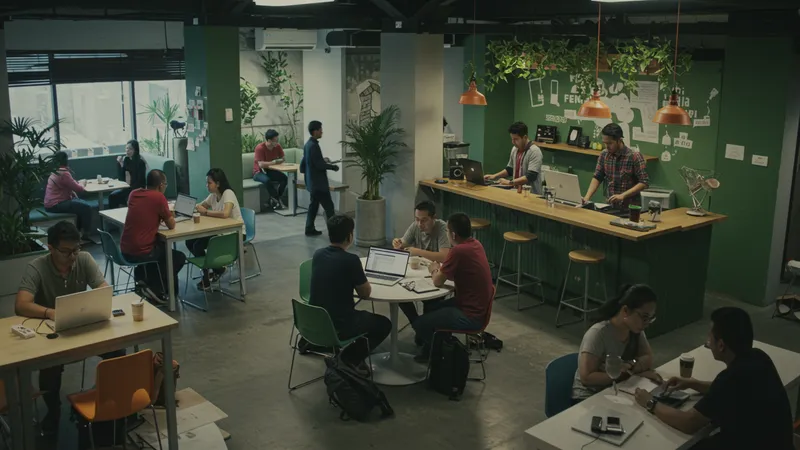
Co-working spaces are now becoming hubs for innovation, offering workshops, networking events, and mentorship opportunities. This transformation means that workers can experience professional growth without ever setting foot in a traditional office. With such changes, companies are re-evaluating the necessity of maintaining expensive properties. But there’s one more twist to this evolving paradigm…
This shift is also boosting local economies, as these workspaces buy from area vendors and support neighborhood businesses. It’s a ripple effect fostering community well-being and economic health. Yet, what you read next might change how you see this forever. Large enterprises are starting to invest in these models, driven by some compelling factors.
The evolution isn’t just about creating new work environments. It’s about reimagining work itself. With the advent of technological connectivity, this is merely the beginning of an evolving work culture. And the impacts of such a shift might be more profound than anyone has anticipated. What comes next may redefine success in the workforce landscape…
In Indonesia, traditional job roles are experiencing an unexpected evolution due to technological advancements. Industries like agriculture and manufacturing, which have long been perceived as static, are integrating AI and remote monitoring tools to increase efficiency and productivity. The fusion of technology with these roles is not just facilitating operations but is also creating education paths for future workers.

This convergence of technology in traditional roles means that workers are now acquiring digital skills, leading to a more versatile workforce. The role of technology is crucial because it’s no longer confined to IT sectors alone—it’s reshaping every conceivable field. As industries become tech-savvy, the lines between white-collar and blue-collar roles begin to blur. But this is only the surface of what’s unfolding…
In an interesting turn, remote work tools are also enabling skilled workers from rural areas to access opportunities previously restricted to urban locals. This democratization of work is changing the socio-economic colors of many regions, bridging gaps, and fostering equality. However, the ripple effects of this trend are far-reaching and complex, and the following section uncovers a curious development.
With enterprises embracing these tools, they’re not just focusing on productivity but also on sustainability. By integrating remote solutions, companies are minimizing their carbon footprint. It’s a win-win scenario that showcases the unexpected benefits of technology and its role in supporting environmental goals. But where does the journey take us next? You might find it illuminates a path to an even brighter future…
The rise of remote tools and technology has not only impacted work habits but has also fundamentally altered team dynamics within Indonesian businesses. Employees now function through a lens of hyperconnectivity, allowing for instantaneous collaboration across vast distances. This connectivity is pivotal in breaking down barriers that once hindered prompt decision-making and streamlined communication.
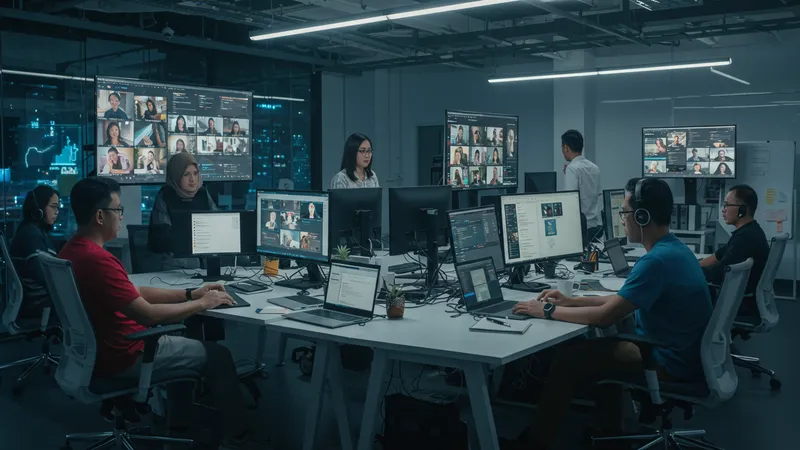
This transformation is particularly evident in how teams are now project managed. Using platforms like Asana or Monday.com, team members can share real-time updates, track progress, and meet deadlines with unprecedented efficiency. It’s a structure that harnesses the power of digital tools to foster collaboration even when miles apart. Intriguingly, where will this interconnectedness lead us next?
But hyperconnectivity brings its unique challenges, including the need to manage digital fatigue and ensure cybersecurity. Companies must now navigate the complexities of maintaining worker well-being while safeguarding sensitive information. The necessity for balance creates a new layer of responsibility for management teams. As they pivot to accommodate these changes, this could be a double-edged sword with unforeseen consequences…
In this evolving landscape, effective leadership becomes indispensable. Remote leaders are tasked with crafting an engaging virtual culture, which, while challenging, offers an opportunity to innovate traditional leadership methods. As leaders adapt, a new style of governance is emerging, one that could fundamentally alter workplace culture as we know it. The next section reveals a fascinating twist in this ongoing transformation…
As remote work takes center stage, the traditional metrics for measuring success within Indonesian workplaces are undergoing a significant overhaul. Output quality and productivity are increasingly prioritized over hours clocked at a desk. This shift involves focusing on actual contributions and achievements rather than merely being present, forcing companies to redefine what success truly means in the modern workforce.

Managers are now evaluating performance based on deliverables and impact rather than standard conventions like punctuality and time adherence. This shift encourages a results-oriented mindset that promotes innovation and creativity. It’s a change that challenges workers to engage with their full potential. But the transition isn’t without its hurdles, as we’ll see shortly.
Workers who previously thrived in structured environments now face the task of adapting to a results-driven approach. It’s a paradigm shift that requires a new set of skills, including discipline and time management. While daunting, this shift also opens doors for personal growth and professional development. What you’ll discover next sheds light on a powerful undercurrent driving this revolution.
Additionally, this method of assessment provides valuable data insights, enabling companies to refine strategies and introduce more tailored interventions. As organizations fine-tune their approach, they are uncovering patterns that promise greater efficiency and growth. This evolution in measuring success presents a roadmap to innovative business practices that might significantly alter the future landscape of work…
Remote work is not just changing workplaces; it’s reshaping the very fabric of Indonesian society. With the ability to work from anywhere, urban migration patterns are seeing a reversal, as people choose quality of life over metropolitan living. This shift holds significant potential for rural rejuvenation, with remote work serving as a catalyst for regional economic revitalization.

Families are rediscovering time and flexibility due to reduced commuting, which encourages a healthier work-life balance. This transformation enhances general well-being and fosters a stronger community connection. As these cultural shifts unfold, their impacts stretch far beyond individual workers. What comes next is a curious insight into an opportunity born from these changes.
The economic revival of rural areas is leading to broader societal changes, including improved access to facilities and infrastructure previously confined to urban settings. Remote work is providing a unique solution to brain drain, retaining talent within otherwise declining regions. Could this be the unexpected remedy to regional disparities? The implications are extensive.
As societal structures realign, we witness the emergence of new cultural norms. The remote work paradigm encourages the blending of traditional practices with modern living. This fusion fosters inclusivity and enriches cultural diversity, revealing an unexpected benefit of the remote work evolution. Stay with us as we explore the profound implications of this cultural shift in greater depth…
Managing remote teams effectively poses distinct challenges for Indonesian companies accustomed to traditional workplace settings. Remote management requires not only digital savvy but also a nuanced approach to leadership that fosters trust and accountability. The transition from face-to-face supervision to managing via screens necessitates a rethink of management practices.
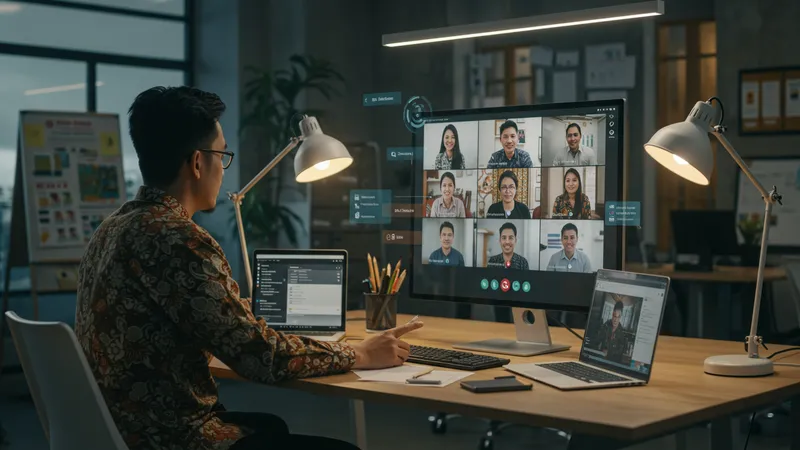
The absence of physical presence makes fostering a sense of team cohesion difficult. Managers must implement strategies to build rapport and trust virtually, often leveraging technology to create engaging and interactive environments. This new approach demands continual learning and adaptation. Yet, there’s an unforeseen benefit to these challenges that we'll reveal further.
The shift to remote management places an emphasis on clear communication and setting explicit expectations. Managers are encouraged to adopt more flexible and empathetic leadership styles, understanding the diverse circumstances remote workers face. This adaptability is fostering stronger, more resilient team cultures across Indonesia. But how can these evolving practices hold up in the long term?
Circumventing traditional management challenges, remote leadership offers opportunities for innovative strategies that incorporate feedback and foster open dialogue. This dynamic can result in a more cohesive and empowered team, breaking free from conventional restraints. As Indonesian companies embrace these new norms, they may discover the unexpected potential in remote leadership. The final twist provides a bold insight into the future of management…
The shift towards remote work tools in Indonesia is having a notable positive impact on the environment. By reducing the need for daily commutes, the carbon footprint of thousands of employees has diminished significantly. This eco-friendly shift is more than just a byproduct; it’s a deliberate stride towards sustainable business practices.
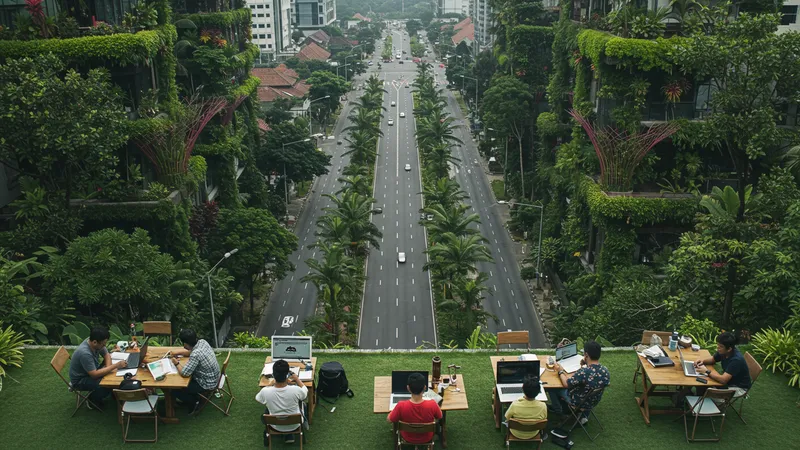
Many organizations are adopting remote work policies specifically to support green initiatives. This reduction in travel not only cuts emissions but also decreases the energy consumption associated with large office buildings. It’s an approach that aligns with broader global efforts to tackle climate change. But are we truly harnessing the potential of this transition?
With the reduction in resource consumption, companies are also discovering economic benefits, highlighting the synergy between financial savings and ecological responsibility. This operating model is becoming increasingly attractive across sectors, challenging traditional work environments. But there’s one more crucial aspect to consider.
Despite these advantages, the sudden increase in digital data usage presents its own environmental challenges, prompting a need for greener data centers and more eco-efficient tech solutions. Addressing these issues remains pivotal to ensuring that the overall impact of remote work remains positive. What lies ahead is the ultimate balancing act—one that might just redefine sustainability efforts. Can remote work truly lead us to a greener tomorrow?
Local startups across Indonesia are finding unique ways to capitalize on the remote work boom, creating innovative solutions tailored to meet the demands of a distributed workforce. From developing home-grown productivity apps to providing virtual well-being solutions, startups are quickly becoming key players in this digital transformation.

These startups are not only focusing on technology but also on cultural compatibility, offering solutions that align with the diverse needs of Indonesia’s workforce. The local perspective on global challenges has positioned these startups as competitive players on the international stage. But the story doesn’t end there.
The agility of startups allows them to quickly adapt to changes, filling gaps left by larger, slower organizations. This ability to pivot rapidly gives them a competitive edge, capturing market share with unique offerings. However, this race for innovation is just beginning, and the next development could reshape the entire landscape.
Investors are taking notice, pouring resources into startups that demonstrate potential not only for profitability but also for societal impact. As these young companies grow, they are poised to fundamentally alter how work gets done, driving an entrepreneurial shift across the country. The next page unveils a surprising revelation regarding startup success and its implications for the future…
Education in Indonesia is undergoing a transformation to prepare a generation for a future dominated by remote work. Schools and universities are rapidly adjusting their curriculums to include technology-centric courses, focusing on digital literacy and remote work skills. This shift is crucial as it aligns educational outcomes with industry demands.
With the integration of technology in classrooms, students are gaining firsthand experience in remote collaboration and communication tools. This practical exposure equips them with the skills needed to thrive in a digitally-driven workplace. Yet, equipping students with these skills presents its own unique set of challenges.
The democratization of education through online learning platforms has greatly expanded access, offering courses to students in rural areas who previously faced educational barriers. This shift promotes inclusivity and prepares a diversified workforce. But with increased accessibility comes the need for robust support systems to ensure quality education for all.
Educators are navigating the difficulties of maintaining engagement and ensuring comprehensive learning outcomes online. Innovations in educational technology are helping overcome these obstacles, paving the way for a more interactive and effective learning environment. What happens next in the education sector could redefine how Indonesian students prepare for their future careers. The subsequent insights reveal the unfolding evolution…
The advent of remote work has brought the importance of digital well-being to the forefront of workplace discussions. As Indonesian workers adapt to hybrid work environments, the need to balance professional obligations with personal life has intensified. Companies are initiating wellness programs to combat digital fatigue and ensure a holistic approach to employee health.

Technology, though a beacon of convenience, brings with it the challenge of constant connectivity. The blurring lines between work and home life create stress, leading to exhaustion and burnout. Addressing these issues is essential for maintaining a happy and productive workforce, and some Indonesian companies are pioneering unique solutions.
Employers are introducing flexible work hours, mental health days, and digital detox initiatives to support well-being. These measures acknowledge the importance of mental health in the digital age, indicating a significant shift in workplace wellness priorities. However, ensuring lasting change requires a broader cultural acceptance of these policies.
The role of leadership in promoting digital well-being cannot be overstated. Managers are encouraged to lead by example, fostering environments where employees feel supported and balanced. As more companies embrace these practices, the results may redefine the very essence of workplace wellness. What comes next will illustrate this transformative journey in action.
Remote work has spurred the growth of virtual networking opportunities, creating new avenues for professionals in Indonesia to connect and collaborate. With global barriers reduced, workers now enjoy unprecedented access to international peers and mentors, broadening their professional horizons beyond local or regional confines.
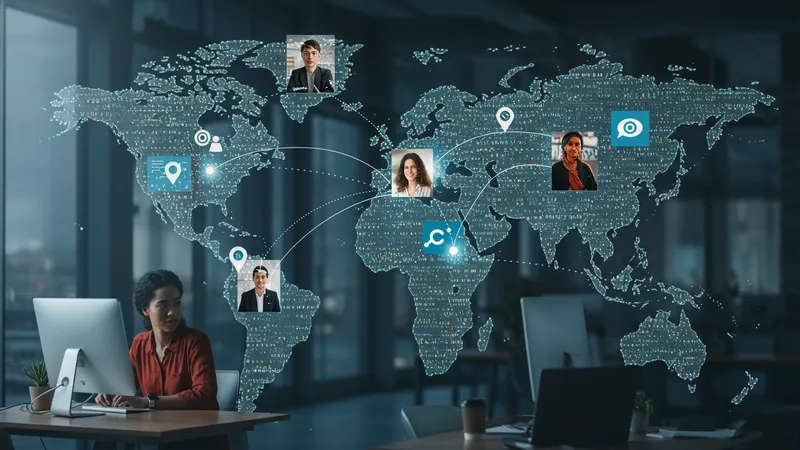
Virtual networking platforms and online communities provide a fertile ground for professional development, offering not just connectivity but also avenues for skill enhancement and knowledge sharing. This paradigm enriches the professional landscape, making it a vibrant space for innovation and opportunity. However, navigating this new world comes with its challenges.
Cultivating meaningful online relationships requires different strategies than traditional networking. Professionals must learn to engage in virtual settings, ensuring that interactions remain genuine and impactful. As these skills develop, the benefits of diverse, global networks become apparent, driving shifts in career trajectories and personal growth.
With such expansive connectivity, Indonesians are finding a foothold in emerging industries worldwide. These opportunities showcase the boundless potential of remote work to foster globalization in professional contexts. The last insight in this burgeoning narrative promises a view into the future possibilities of remote connectivity.
The future of remote work in Indonesia looks bright, with companies and employees embracing the possibilities that this new era promises. Predicting the trajectory of this evolution involves acknowledging both the opportunities and challenges it presents, including shifts in organizational structures, workspace designs, and employment strategies.

Flexibility is key in this unfolding narrative, with remote work fostering adaptive strategies that are reshaping company cultures. Organizations are re-evaluating their core principles, experimenting with new ways to engage workers and ensure everyone is motivated. But the full extent of these changes remains to be seen as we peer deeper into the coming trends.
As we advance, the blending of remote work with emerging technologies such as artificial intelligence, augmented reality, and blockchain could redefine business operations in unimaginable ways. This convergence promises to unlock potentials that are yet to be fully realized, painting a picture of an exciting frontier in the workforce evolution.
For Indonesia, this marks a pivotal moment—a chance to lead in innovation, drive economic growth, and redefine how work is conceptualized and executed. Each step forward in this shift uncovers further questions and possibilities, ensuring that the remote work story continues to be one of transformation and discovery.
As the evolution of remote work continues to unfold, one thing is certain: Indonesia is poised to benefit from these changes in unprecedented ways. With adaptability and innovation at the forefront, the country's workforce is redefining what it means to work in a digital age. Share these insights and be a part of the movement that is reshaping work for a new generation. Bookmark this page to keep abreast of the latest developments in Indonesia’s remote work revolution.